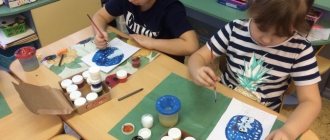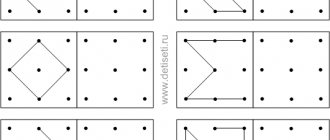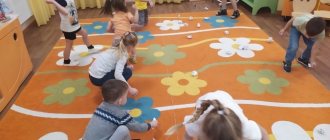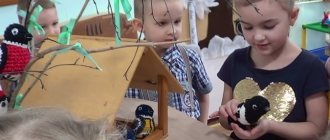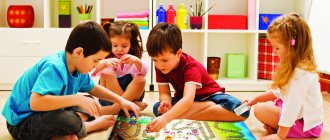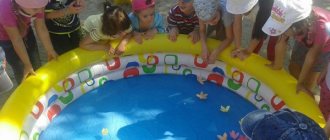All children in the world are united by a love of games.
Play is a natural need for a child, since it is in the form of play that children learn about the world, understand how it works, and consciously comprehend the experience gained.
Play is important not just as a source of joy and good mood, it develops the brain, imagination, creativity, vocabulary, social skills, the ability to learn and perceive more complex information.
How do 6-7 year old children develop?
At this age, the baby’s thinking abilities enter a new, better stage of development.
By age 6, most children:
- master reading, writing, counting to 20;
- understand the simplest time intervals;
- focus longer on one solution to one logical problem;
- their reasoning becomes more meaningful;
- understand information better by listening.
What games are useful at this age?
For a preschooler, different forms of games will be useful.
Psychologists recommend involving children in the following game formats:
- child-initiated play;
- play initiated by an adult;
- a traditional game when both a child and an adult can take the initiative.
From the point of view of benefits, the most significant games are those offered by adults, since in this case the child finds himself in a learning situation, gets acquainted with new words, concepts and can make this situation manageable.
As for choosing a specific game format, it all depends on the situation. For the street, outdoor games are selected that contain an element of sports. At home, you can play board games or role-playing games, or assemble a construction set.
1. Outdoor games develop coordination, strength, endurance, and reaction speed. At the age of 6-7 years, the game lasts about half an hour.
2. Board games help brighten up your leisure time when the weather is bad outside. With the help of cubes, puzzles, figures, cards, the child improves his skills - logic, spatial thinking, social interaction, speech, concentration, will.
There are a huge number of board games - walkers, puzzles, cubes, mosaics, construction sets, flashcards, strategies.
3. Educational games - in this case we are talking about the targeted development of a specific skill or ability, for example, speech, gross motor skills, intelligence, imagination.
The use of such games prepares fertile ground for the further development of the child’s creative abilities and talents. The training program is structured from simple to complex, but the conditions of each task should be slightly ahead of the child’s developmental level.
Games 30. Plant
First of all, you need to make a plant - a tree, a flower - from any available materials. Then the child composes a fairy tale about him. The main thing is that in the story the child describes in detail how the plant feels - is it comfortable or is something bothering it.
Through these metaphors, an adult can understand what is bothering the child. If there is a cause for concern, ask your child what you can do to help the plant - build a fence, call a fairy, plant other trees. This way the baby will use the example of a fairy tale to cope with his anxieties.
Games 31. Face games
In children who have suffered some unpleasant events in life, a frozen mask may appear on their face and emotions disappear. You can motivate your child in several ways - invite him to play tricks, make funny faces with him, or organize a home theater.
Games 32. Simple holidays
Allow your baby to feel the holiday in your life as often as possible. Try to turn every simple event into something bright and unusual. For example, the festival of making the bed, washing, the festival of lunch. Be sure to record any of your child’s achievements, write them down or draw them - this motivates and builds confidence in yourself and your abilities.
Games 33. Color therapy
If your child often returns to unpleasant events in the past, focus his attention on the current day, for example, come up with a specific color for each day of the week and try to stick to it. For example, let Monday be blue - pick up such clothes, look for blue objects around.
Games 34. Schedule
To stabilize a child’s condition after a stressful situation, it is necessary to structure his daily routine, draw up a schedule, and decorate it. The kid must monitor its implementation. On the one hand, it teaches discipline, and on the other, it distracts from unpleasant thoughts.
Advice! Anxious children prone to stress intuitively choose outdoor games where they need to jump. This helps relieve tension and feel supported. Create an area for your child where he can jump safely and happily.
Conflict situations sometimes occur between children, and here play becomes critically important, since with its help the child relieves stress and relaxes . Of course, games should be appropriate for the child’s age and development, be diverse and useful. This is what we will talk about in our material.
Where to find time to play with your child
This question is asked by many parents, since modern moms and dads are busy people who have a lot of household responsibilities, work, of course, and a natural desire to take time for themselves and relax. Due to the fact that there is not enough time to spend with the baby, parents often worry and worry. Psychologists assure that you can find time to communicate with your child if you follow simple tips.
Tip 1 – play with your child and mind your own business at the same time.
Games that do not require special training or additional items can be played in the kitchen, bathroom, or on the street. If you don’t feel like playing, involve your child in homework, do something together, for example, make pizza, or just let your child help you.
The main thing is to talk to the child more, explain, praise and support.
Tip 2 – use any free minute.
Transport, queues, the road to somewhere - this time can be used profitably. Tell your child about natural phenomena, make riddles, compose fairy tales, play counting and words.
Tip 3 – games and activities should become a habit.
Of course, we are not talking about classes for an hour or two. Make it a rule to work with your child every day for 15-20 minutes; this will be quite enough for a child aged 6-7 years. For example, read a book to your child before bed.
Tip 4 – try to create a nurturing environment at home.
Use posters, manuals, cards, magnetic games. The more educational objects there are around a child, the faster he will remember information. Please note that developmental aids should be bright and colorful.
Tip 5 – find company for your child.
If this is the case and you cannot play with your baby, try to find children for him with whom he can spend his time.
Free activities and lessons to prepare for school
Svetlana Orochko
Svetlana Orochko is the author of her own course on teaching preschoolers and primary school students, the creator of the “Firefly” preschool education center, a primary school teacher, and a preschool education teacher. She provides free classes on her YouTube channel, Svetlana, such as:
- We teach children to read.
- Fun geometry.
- Composition of numbers.
- Studying numbers.
- Getting ready for school.
- Developing memory.
- We make a word from syllables.
There are also video lessons for parents. Before each lesson, Svetlana Orochko gives explanations, where she suggests materials that need to be worked through together with the child, provides useful information about the school (for example: how to choose a primary school teacher).
More details
KaraDeRo
The YouTube channel Karadero was founded by primary school teacher Elena Vasilievna Rybalchenko. It contains informative and educational videos that will help you prepare for school, show you how to correct your handwriting, and gain new skills. The following educational videos are offered for children:
- I'm learning to count.
- Alphabet with a mouse.
- English alphabet, letters.
- Beautiful handwriting.
- How to teach how to write numbers beautifully.
- Speech therapy games.
- Mathematics for children 4-7 years old.
- Paid online courses to prepare for school
More details
Intelligence of a child aged 6-7 years
At this age, children have already formed personalities and have their own views on the world around them and what is happening in it. The child understands his position both in the children's team and among adults, and accordingly builds a line of behavior and forms a certain attitude towards the people who surround him.
The level of emotional development in children 6-7 years old is also quite high. They show sympathy , empathize, feel the mood of other people, and offer help.
- We are talking about children who are almost first graders, they can control their mood, follow the instructions and requests of adults, and take part in group and individual activities.
Advice! Since children 6-7 years old easily navigate circumstances, parents can give their child the basics of personal safety and teach them to find a way out of difficult situations.
2. At 6-7 years old, children show an active interest in new knowledge, since at this age the memory capacity increases, the child’s attention becomes more concentrated, and the vocabulary expands (up to 6 thousand words).
3. Parents need to continue classes on the development of children’s speech, familiarize children with the structure of language, in addition, develop fine motor skills, logic, and the ability to systematize objects by characteristics.
Required Skills
Very often I hear from adults regrets that they were not taught important and necessary things at school. For example, how to handle money, how to properly organize your time, how to speak confidently and convincingly.
Modern parents have an invaluable opportunity to fill the missing gaps in school education and teach their children the necessary skills. And the following courses will help them with this.
Financial literacy for children 6–13 years old – Umnasia
The online course on financial literacy is designed for children aged 6 years and older. It will help the child form an idea of what money is, where it comes from, and how the Russian and world economy works. Training takes place in a fun and playful way. I liked that the course is divided into 5 steps. You can start with any one depending on the student’s level.
In a programme:
- developing healthy financial habits;
- formation of ideas about the real value of money;
- training in managing personal and family budgets;
- familiarity with common banking products (loan, deposit, etc.);
- introduction to the market economy and familiarity with the principles of company operation.
The course contains gamified tasks and interactive examples. It definitely won't be boring.
The cost of passing any one level is 1,990 rubles. All 5 steps can be completed for RUB 3,790. Upon completion, a certificate is issued.
Young speaker – Nadezhda Trofimova
Young Speaker is a special course for children 7–12 years old, in which they will learn to speak beautifully and confidently in any situation: when communicating with peers, while answering at the blackboard, or speaking in public. The course consists of 15 lessons of approximately 25 minutes each.
In a programme:
- practicing self-presentation skills;
- drawing up a plan and outline of a speech;
- ways to gain confidence before performing;
- expressiveness of speech and gestures;
- practicing various types of speeches: congratulations, announcements, excursions, reciting poetry and prose.
After completing this course, the child will forget what fear of public is, learn to speak beautifully, succinctly and emotionally, get rid of filler words, improve his voice and articulation. There is a lot of practice in the course. Homework is checked by a supervisor.
The cost of training is 3,800 rubles. Access to materials is available for six months.
Time management for schoolchildren – Veronica Lashuk
In the Time Management course for schoolchildren, your child will learn how to effectively manage their time. This invaluable skill will help him seriously simplify and optimize his entire subsequent life.
The course is quite comprehensive. It consists of 36 academic hours. This time is enough for students to learn and apply the necessary tools for planning, goal setting and work organization.
In a programme:
- how to manage everything and not get tired;
- why do you need to save time?
- the ideal daily routine of a schoolchild;
- SCRUM tools for time management.
After completing the training, a state certificate is issued.
Computer Literacy - Foxford
The Computer Literacy course will teach your child to confidently use a computer. It consists of 16 lessons, each of which has theory and practical tasks. The course is taught by programming teacher Roman Nikitin.
In a programme:
- computer device;
- training in computer graphics and animation;
- getting to know the Internet;
- Internet safety techniques;
- creating presentations;
- basics of web design.
Tuition fee – 1,990 rubles. One lesson can be taken for free.
Also take a look at our selection of computer courses for children.
Your creativity at the tip of your pen – Children's Art School
Your creativity at the tip of your pen - a free course on developing beautiful handwriting. Of course, this is not the most necessary skill in life, but it is an additional advantage to all the others.
The course is designed for children aged 9–13 years. It is taught by graphic design teacher Svetlana Rodina. In a programme:
- posture setting;
- history of writing, fonts, letters;
- learning to write in different fonts.
The course consists of 8 lessons of 30 minutes each. During the course, students complete tasks and post them on their social network page. The curator checks the assignments. To take the course, you must register.
Safety Lessons - Foxford
Safety Lessons is a course that will teach a child 4–12 years old the rules of safe existence in the modern world. It contains 10 video lessons of 10 minutes each. The animated characters Masha and the Bear from everyone's favorite cartoon will help you master the rules.
The following situations are considered:
- the child is teased at school;
- a stranger on the street offers a treat;
- an iron or other electrical appliance caught fire at home;
- a child gets lost in the city or in the forest;
- someone on the Internet asks for a home address and others.
The child will receive clear instructions on how to act in all these cases. Homework will help him consolidate and master the material. In addition, the course includes a test on knowledge of safety rules and a checklist for parents with a list of situations in which behavior must be discussed with the child.
Tuition fee: RUB 3,490. The first lesson is free.
